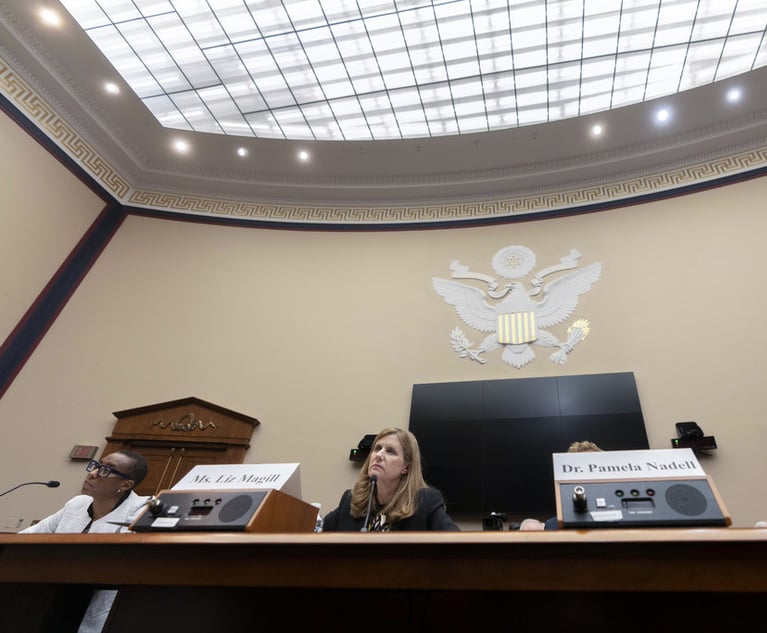Justices Show Their Colors in SCOTUS Gerrymandering Case
Amid dire predictions of an imminent end to democracy, the U.S. Supreme Court on Tuesday debated whether modern-day gerrymandering is so partisan and polarizing that it violates the Constitution.
October 03, 2017 at 03:43 PM
5 minute read
The original version of this story was published on National Law Journal
 Demonstrators outside the U.S. Supreme Court on the day of arguments in Gill v. Whitford, Tuesday, October 3, 2017.
Demonstrators outside the U.S. Supreme Court on the day of arguments in Gill v. Whitford, Tuesday, October 3, 2017.
(Photo: Diego M. Radzinschi/ALM)
Amid dire predictions of an imminent end to democracy, the U.S. Supreme Court on Tuesday debated whether modern-day gerrymandering is so partisan and polarizing that it violates the Constitution.
“You are the only institution that can solve this,” lawyer Paul Smith told the justices, asserting that legislators themselves are unlikely ever to put an end to redistricting practices that give them a lock on election outcimes.
True to form, Justice Anthony Kennedy emerged as the swing vote, and he appeared to swing toward a First Amendment theory that would end extreme gerrymandering because it silences the political voice of voters in the minority party.
But other justices also played their typical roles, complicating any prediction of the outcome of Gill v. Whitford, the case being argued Tuesday before a large audience that included former California governor Arnold Schwarzenegger, a vocal advocate for terminating gerrymandering.
The case is a challenge to Wisconsin's latest redistricting plan, which in 2014 resulted in Republicans winning 63 of 99 state assembly seats with only 52 percent of the vote. Twelve Wisconsin voters from 11 districts sued the state, and whether they had standing to complain about statewide redistricting was a strong undercurrent during Tuesday's arguments.
Edward Foley, an election law expert at the Ohio State University Moritz School of Law, said before the hearing that Gill was “one of those rare cases for which what transpires during oral argument genuinely has a chance to be outcome-determinative.” Foley might be right. Justices seemed to tip their hand or show their colors more than usual:
 (Photo: Diego M. Radzinschi)
(Photo: Diego M. Radzinschi)Roberts, Court Protector: In his 12th year as chief justice, John Roberts Jr. often views groundbreaking cases through the lens of what a given decision will do to the court's docket and image. “There will be a lot of these claims” asserting unconstitutional gerrymandering, Roberts said. “Everyone will come here for a decision on the merits. We will have to decide whether the Democrats or Republicans win … The intelligent man on the street will say, 'that's a bunch of baloney.' … That is going to cause very serious harm to the status and integrity of the decisions of this court in the eyes of the country.”

Gorsuch, Sarcastic Constitutionalist: Justice Neil Gorsuch, who seems to use sarcasm to get responses from lawyers, said the proposed metrics for appraising gerrymandering reminded him of the spices he likes on his steak—he mentioned turmeric. “I like a few other little ingredients, but I'm not going to tell you how much of each,” he said. “What's the court supposed to do? A pinch of this, a pinch of that?” He then rattled off provisions of the Constitution that give the states and Congress—not the courts—power over elections and redistricting.
This content has been archived. It is available through our partners, LexisNexis® and Bloomberg Law.
To view this content, please continue to their sites.
Not a Lexis Subscriber?
Subscribe Now
Not a Bloomberg Law Subscriber?
Subscribe Now
NOT FOR REPRINT
© 2025 ALM Global, LLC, All Rights Reserved. Request academic re-use from www.copyright.com. All other uses, submit a request to [email protected]. For more information visit Asset & Logo Licensing.
You Might Like
View All
Big Law Congressional Investigations Practices Are Proliferating. Here's Why
5 minute read
Supreme Court Eyes Major Cases on Climate Change, Voting Rights Act

All the President's Lawyers: Watergate's Lasting Impact on the Legal Profession
5 minute read
National Bar Association Names New GC as Organization Takes on Voting Rights Issues
Trending Stories
- 1Public Notices/Calendars
- 2Monday Newspaper
- 3Judicial Ethics Opinion 24-98
- 4'It's Not Going to Be Pretty': PayPal, Capital One Face Novel Class Actions Over 'Poaching' Commissions Owed Influencers
- 511th Circuit Rejects Trump's Emergency Request as DOJ Prepares to Release Special Counsel's Final Report
Who Got The Work
Michael G. Bongiorno, Andrew Scott Dulberg and Elizabeth E. Driscoll from Wilmer Cutler Pickering Hale and Dorr have stepped in to represent Symbotic Inc., an A.I.-enabled technology platform that focuses on increasing supply chain efficiency, and other defendants in a pending shareholder derivative lawsuit. The case, filed Oct. 2 in Massachusetts District Court by the Brown Law Firm on behalf of Stephen Austen, accuses certain officers and directors of misleading investors in regard to Symbotic's potential for margin growth by failing to disclose that the company was not equipped to timely deploy its systems or manage expenses through project delays. The case, assigned to U.S. District Judge Nathaniel M. Gorton, is 1:24-cv-12522, Austen v. Cohen et al.
Who Got The Work
Edmund Polubinski and Marie Killmond of Davis Polk & Wardwell have entered appearances for data platform software development company MongoDB and other defendants in a pending shareholder derivative lawsuit. The action, filed Oct. 7 in New York Southern District Court by the Brown Law Firm, accuses the company's directors and/or officers of falsely expressing confidence in the company’s restructuring of its sales incentive plan and downplaying the severity of decreases in its upfront commitments. The case is 1:24-cv-07594, Roy v. Ittycheria et al.
Who Got The Work
Amy O. Bruchs and Kurt F. Ellison of Michael Best & Friedrich have entered appearances for Epic Systems Corp. in a pending employment discrimination lawsuit. The suit was filed Sept. 7 in Wisconsin Western District Court by Levine Eisberner LLC and Siri & Glimstad on behalf of a project manager who claims that he was wrongfully terminated after applying for a religious exemption to the defendant's COVID-19 vaccine mandate. The case, assigned to U.S. Magistrate Judge Anita Marie Boor, is 3:24-cv-00630, Secker, Nathan v. Epic Systems Corporation.
Who Got The Work
David X. Sullivan, Thomas J. Finn and Gregory A. Hall from McCarter & English have entered appearances for Sunrun Installation Services in a pending civil rights lawsuit. The complaint was filed Sept. 4 in Connecticut District Court by attorney Robert M. Berke on behalf of former employee George Edward Steins, who was arrested and charged with employing an unregistered home improvement salesperson. The complaint alleges that had Sunrun informed the Connecticut Department of Consumer Protection that the plaintiff's employment had ended in 2017 and that he no longer held Sunrun's home improvement contractor license, he would not have been hit with charges, which were dismissed in May 2024. The case, assigned to U.S. District Judge Jeffrey A. Meyer, is 3:24-cv-01423, Steins v. Sunrun, Inc. et al.
Who Got The Work
Greenberg Traurig shareholder Joshua L. Raskin has entered an appearance for boohoo.com UK Ltd. in a pending patent infringement lawsuit. The suit, filed Sept. 3 in Texas Eastern District Court by Rozier Hardt McDonough on behalf of Alto Dynamics, asserts five patents related to an online shopping platform. The case, assigned to U.S. District Judge Rodney Gilstrap, is 2:24-cv-00719, Alto Dynamics, LLC v. boohoo.com UK Limited.
Featured Firms
Law Offices of Gary Martin Hays & Associates, P.C.
(470) 294-1674
Law Offices of Mark E. Salomone
(857) 444-6468
Smith & Hassler
(713) 739-1250






